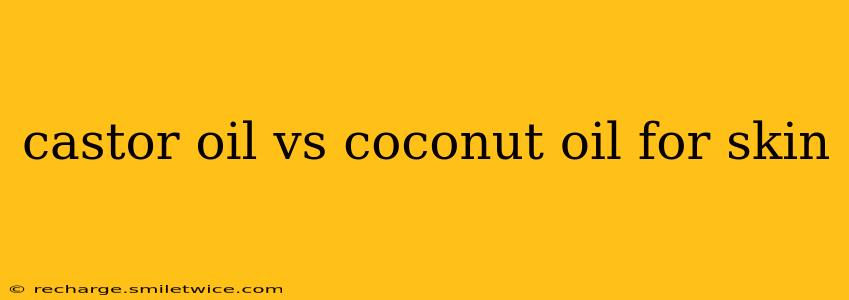Choosing between castor oil and coconut oil for skincare can feel overwhelming. Both are natural oils boasting numerous benefits, but their properties differ significantly, making them better suited for different skin types and concerns. This in-depth comparison will help you determine which oil is the right choice for your unique needs.
What are the benefits of castor oil for skin?
Castor oil, derived from the castor bean plant, is a thick, viscous oil rich in ricinoleic acid, a fatty acid with potent anti-inflammatory and antimicrobial properties. This makes it particularly beneficial for specific skin issues. Its thick consistency also helps to create a protective barrier on the skin.
Benefits:
- Treats Acne: Ricinoleic acid helps combat Cutibacterium acnes, a bacteria linked to acne development. While not a cure-all, it can be a helpful addition to an acne treatment regimen.
- Soothes Eczema and Psoriasis: Its anti-inflammatory properties can help reduce redness, itching, and inflammation associated with these conditions. However, it's crucial to do a patch test first to avoid adverse reactions.
- Promotes Hair Growth: While primarily used for skin, castor oil is often lauded for its potential to stimulate hair growth, making it a popular choice for those experiencing hair thinning or loss. This is thought to be due to its ability to improve scalp circulation.
- Moisturizes Dry Skin: Though thick, castor oil does provide a moisturizing effect, particularly for dry and cracked skin. However, its heavy texture may not be suitable for all skin types.
What are the benefits of coconut oil for skin?
Coconut oil, extracted from the kernels of coconuts, is a lighter oil than castor oil. Its primary benefits stem from its high lauric acid content, a medium-chain fatty acid with antimicrobial and moisturizing properties.
Benefits:
- Moisturizes and Hydrates: Coconut oil forms a protective barrier on the skin, preventing moisture loss and keeping it soft and supple. It's particularly beneficial for dry skin types.
- Reduces Inflammation: While less potent than castor oil's anti-inflammatory effects, coconut oil can still provide soothing relief for minor skin irritations.
- May Help with Wound Healing: Some studies suggest coconut oil may promote wound healing by reducing inflammation and preventing infection.
- Sunscreen properties (controversial): While some claim coconut oil offers SPF protection, this is largely inaccurate. It offers minimal sun protection and should not be used as a replacement for proper sunscreen.
Which oil is better for acne-prone skin?
While both oils possess antimicrobial properties, castor oil is generally considered better for acne-prone skin due to its higher concentration of ricinoleic acid. However, its thick consistency might clog pores in some individuals. A patch test is highly recommended before applying it to a large area of the face. For those with acne, using it sparingly and potentially diluting it with a lighter carrier oil might be beneficial.
Is coconut oil good for dry skin?
Coconut oil is an excellent moisturizer for dry skin. Its ability to form a protective barrier on the skin helps prevent moisture loss. It's easily absorbed and leaves the skin feeling soft and hydrated.
Can I use castor oil and coconut oil together?
While you can use both oils together, it's important to consider their textures. The combination might be too heavy for some skin types. You could try diluting castor oil with coconut oil to reduce its thickness or apply a small amount of each separately.
Is one oil better than the other?
There's no single "better" oil. The ideal choice depends entirely on your skin type and concerns. Castor oil is best suited for acne, eczema, psoriasis, and possibly hair growth, while coconut oil excels at moisturizing dry skin and providing general skin hydration. Experimentation and a patch test are key to determining which oil works best for your individual needs. Remember to always consult a dermatologist if you have severe skin conditions or concerns.
